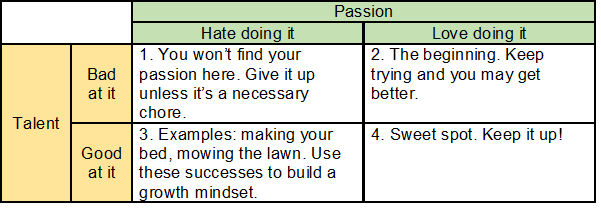What traits do you need to become a successful fiction writer? Of those, which are most important?
Author Anne R. Allen wrote a blogpost some years ago that inspired this line of thinking for me. She had encountered people who thought talent was necessary, and sufficient. They’d send her their written excerpts and ask, “Do you think I’ve got the talent?”
Anne Allen argued, persuasively, that natural talent might aim you in your life’s direction, but is far less important than skill, or several other traits she cited.
I decided to carry the argument in a different direction. Given the traits she mentioned, could I come up with an ordered list from most important to least important?
Using a technique called pair-wise comparison, I used a matrix to compare each trait against each of the others and added up the scores.
First, let’s define each one in alphabetical order:

- Creativity, or Imagination. This wasn’t on Anne R. Allen’s list, but I consider it important. Basically, it’s the ability to come up with new ideas, to invent characters, plots, scene descriptions, etc.

- Drive. This is the inner motivation or impulse to write. It’s that determination, that self-discipline, that pushes you to create fictional worlds.

- Gratitude. By this, Anne meant the willingness to accept help in the form of negative criticism, particularly comments on your manuscript from beta readers and editors. I would have called it Toughness, or Thick Skin, but we’ll keep with Anne’s term.

- Learning. This is the willingness to acquire new writing skills by educating yourself. There are numerous methods, including studying the classics, taking classes, participating in critique groups, and reading books about writing. Choose the method that works for you.

- Marketing. This trait measures how well you understand what your readership wants and how well you expose potential readers to your writing. These days, you have to know the market and be willing to advertise yourself.

- Observation. Anne called this trait “Listening Skills,” but I sought a one-word description. Writers must watch and listen to people, how they behave, what they say, what facial expressions and gestures they use, what verbal expressions and dialect they employ, etc. Such knowledge will make your characters seem more realistic.

- Passion. This describes your love of writing. Although related to Drive, this is more about the pleasure you derive from the act of writing itself.

- Persistence. It’s a measure of your willingness and ability to overcome setbacks, to solve problems and move forward, to rise after falling.

- Skill. This trait describes the quality of your writing. Anne had much to say about skill, but didn’t include it specifically in her list of traits. She defined ‘talent’ as inborn skill, but believed few people had talent, but most could develop skill. Her post suggested that ‘skill’ was an umbrella term that included all the other traits. I believe skill is independent of all of them, and merely addresses how well you write.

- Solitude. Anne called this ‘The Ability to be Alone’ and made it clear that writing is not just for introverts. It’s just that extroverts must leave their comfort zone for a while, since writing is an individual effort.
Obviously, there are inter-relationships and overlaps among these traits. Still, they’re distinct enough that I was able to rate each one in importance against all the others. Below is my subjective list from most important to least:
- Creativity
- Drive
- Passion
- Observation
- Learning
- Skill
- Persistence
- Gratitude
- Marketing
- Solitude
As a general pattern, you can see my most important ones are traits that get you started, and the least important (with the exception of Solitude) are traits you develop as a result of having written and submitted your work.
That list may not seem right to you, but it works for—
Poseidon’s Scribe


